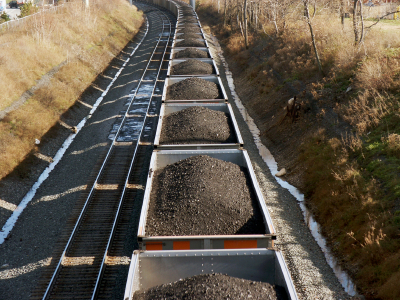Coal companies are in a bit of a bind. Well, a few binds, really, but let’s just focus on one at a time, shall we? Demand for their product domestically has dropped significantly of late, as prices of natural gas have remained low. But demand remains high overseas: In Europe, certainly, but particularly in Asia. So if you are running a coal company (which, if you are: Hello!), there’s an obvious solution. Take all that coal and ship it to China and India.
Or maybe it’s not that easy. From The Hill:
The U.S. Energy Information Administration said Wednesday that coal exports rose 24 percent in the first six months of the year. Exports to Asia experienced a small increase, but insiders said that is largely due to the lack of Pacific Northwest export terminals.
And there’s the problem. The route from Montana coal deposits to the furnaces of Beijing must pass over a high barrier. Not the Rockies. The liberal West Coast.
Exporters have identified five ports in Oregon and Washington from which to send coal to Asia. Nations in that region, which have rapidly expanding economies and loose environmental standards, are a coveted destination for coal producers as use of the fossil fuel drops in the United States.
But [Oregon Sen. Ron] Wyden, who is expected to replace retiring Sen. Jeff Bingaman (D-N.M.) as [chairman of the Energy and Natural Resources Committee] if Democrats retain the Senate, is skeptical about sending coal abroad. He has called for more rigorous environmental reviews of each [coal export] terminal proposal, which many say could hold up coal exports from the Pacific Northwest. …
Much of that coal would come from the Powder River Basin in Wyoming and Montana. Wyden said he is concerned about the impact that activity could have, and also about coal dust settling in communities along the transportation route.
The routes from the coal fields to the coast are one concern. The terminals themselves are another. Already, a planned terminal in Grays Harbor, Wash., has been keiboshed by a rail company following protests by activists.

Like the Keystone pipeline, but open-topped and headed nowhere.
Wyden’s Republican colleagues from Wyoming are concerned on behalf of the coal companies, naturally.
“[E]xpanding the scope of or delaying the environmental review process for new port facilities would create uncertainty for ongoing and future exports of coal from the Powder River Basin as well as Ohio, Virginia, Pennsylvania, Illinois, Kentucky, and West Virginia,” [Sens. John Barrasso and Mike Enzi] told Interior Secretary Ken Salazar and Army Secretary John McHugh in an August letter.
(Tip for the reader: Every time you see the word “uncertainty,” replace it with “regulation that might impact our profits and that we hope to avoid at all costs.” Works in every political context.)
When coal company CEOs dream at night, they dream of two things: Fracking being banned in the United States in perpetuity, and Texas launching a successful armed takeover of California. The former is unlikely to ever happen.




